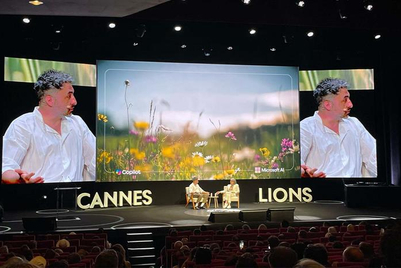
You may soon see more photos with a small circle featuring a letter inside on your social media feed.
No, people aren’t suddenly adding copyrights to their selfies. Rather it’s the letter “B,” as in Bodyright.
TBWA’s New Zealand arm recently launched a campaign, called March Unfiltered, that encourages people to stop retouching their photos on social media in an effort to reduce the mental health problems caused by photo editing. The campaign is part of a larger effort called Bodyright, launched in September 2021.
“The goal is to try to get more natural, unretouched and unfiltered images into the media, advertising and people’s social feeds,” said Shane Bradnick, chief creative officer at TBWA\New Zealand in Auckland. “For a long time, through advertising campaigns’ retouched or manipulated images, through to now [with] the large amount of filtered images in social media, people are exposed to more and more doctored, filtered, retouched imagery of people, which sets these false body ideals that are really hard to live up to.”
March Unfiltered was a week-long effort that started March 28 and encouraged individuals or companies to “flood their feeds only with authentic images that remain unfiltered and unretouched.”
The Ⓑ symbol in photos indicates that a photo has not been retouched. The graphic is available for download on the campaign website, after which people can add it to an image. The campaign operates on the honor system, Bradnick said.
The effort comes amid growing public scrutiny about the role social media plays in mental health, especially that of adolescents. In September, the Wall Street Journal revealed researchers at Instagram, which is owned by Meta, found that the platform makes body image issues worse for one in three of its teenage girl users. Plus, 13% of British users and 6% of American users said that Instagram had caused them to have suicidal thoughts.
Instagram head Adam Mosseri testified in a Senate hearing about the report, where he faced bipartisan criticism and questions about Meta’s alleged lack of protection for young users.
Last year, Norway also passed a law that requires social media advertisers and influencers to add a disclaimer label to retouched images, according to Washington Post.
“I think in media and advertising, it started with, possibly good lighting back in the day and then it became more that we retouched the ads that we did. We would nip people’s waists and would remove wrinkles and remove moles and take freckles out. We removed armpits; we removed knees; we removed elbows. That’s been happening for decades in media and advertising,” said Catherine Harris, CEO at TBWA\NZ. “Sometimes people do it without fully thinking why they are doing it. They are just used to seeing cleaned up imagery.”
TBWA has not “unethically” retouched photos for “a long time,” Harris said, but the company recently introduced a formal policy around photo use. Brands such as Trilogy Skincare, 2degrees and The Warehouse have expressed support for the campaign, according to TBWA\New Zealand.
In addition to using the Ⓑ in photos, supporters can also purchase a necklace and stickers with the symbol.
TBWA\New Zealand also plans to launch Bodyright efforts focused on men, aging and scars, Harris said.
“We’re going to be looking at lots of dimensions around misrepresentation of the human form or a lack of acceptance around the human form,” Harris added.
For the campaign to be effective, influencers must also buy in, Harris said.
“There are so many things to celebrate about the human body,” Bradnick added. “The more we can keep doing that, the more the conversation will hopefully take hold.”


.jpg&h=334&w=500&q=100&v=20250320&c=1)


.png&h=334&w=500&q=100&v=20250320&c=1)




.png&h=334&w=500&q=100&v=20250320&c=1)


.png&h=268&w=401&q=100&v=20250320&c=1)


.png&h=268&w=401&q=100&v=20250320&c=1)
.png&h=268&w=401&q=100&v=20250320&c=1)
